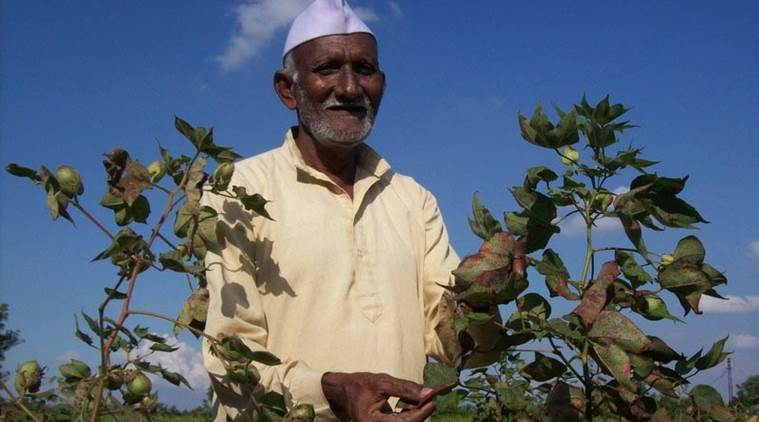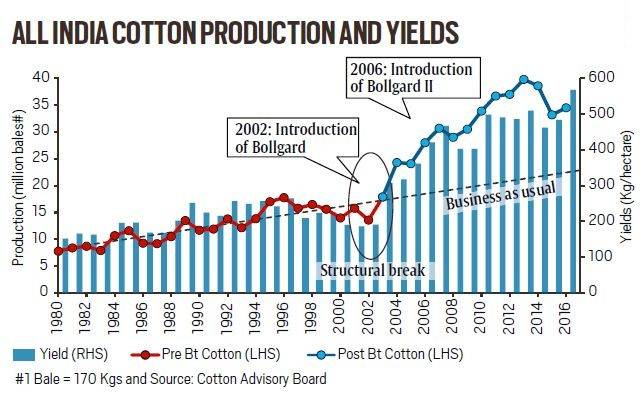From Plate to Plough: Timidity and technology
Vajpayee government’s decision to introduce GM cotton made India a leader in production of the crop. Can the Modi government give a green signal to improve varieties of GM cotton and Bt brinjal and GM mustard?

Sudhakar Kale a farmer of Katpur Village, Amaravati District in Maharastra, shows leaves of a BT cotton plant (Express Archive)
It is almost official now that there is a thriving business in the new cotton technology, Bollgard-II with herbicide tolerant traits. This technology has, however, not been approved by the government. The Field Inspection and Scientific Evaluation Committee (FISEC), set up at the instance of the Prime Minister’s office (PMO), has submitted a report which points out that unauthorised herbicide tolerant Bt cotton was planted in 15 per cent of the area under cotton in Andhra Pradesh, Gujarat, Maharashtra and Telangana and in 5 per cent of the area under cotton in Punjab during the 2017 kharif season. The report also points out that farmers have been paying Rs 1,000 to Rs 1,500 per 450gm packet of seeds, despite an official cap of Rs 800 per 450gm packet of these seeds. The FISEC report also reveals that the seeds have not been smuggled from outside the country but were manipulated with the original varieties of Mahyco Monsanto Biotech Limited (MMBL) that were under trial through official procedures — uncertainties over licensee fees led to the curtailing of the trials.
This indicates the following: Farmers want access to new technologies provided they benefit from them, and they are ready to take risks to procure these seeds even if that means transacting with unscrupulous dealers and paying prices substantially higher than those fixed by the government. On the flip side, the illicit business puts the government’s regulatory mechanism in poor light.
Not surprisingly, as a knee jerk reaction, the premises of several breeding companies were raided. One may also see temporary arrests and/or fines imposed on these unscrupulous players in the next few days. But will such punitive measures solve the problems of the cotton farmers? It is time to think rationally in the interest of cotton farmers. Here, the Narendra Modi government can learn from the Atal Bihari Vajpayee government.
The Vajpayee government was faced with a somewhat similar situation in 2001 when it learnt that some farmers in Gujarat had planted Bt cotton without government approval. The natural bureaucratic reaction was to confiscate and burn the illicit cotton crop. But the political maturity of the then PM averted such an imprudent action. He sensed that there was an opportunity for India to emerge as a leader in biotech. He approved the use of Bt cotton in 2002, the first GMO crop in the country, despite opposition from several quarters. Vajpayee extended Lal Bahadur Shastri’s well-known slogan to include science —”Jai Jawan, Jai Kisan, Jai Vigyan”. He was clear that Indian agriculture should be based on science, and the
country needed to become a leader in the use of biotech in order to fight hunger and malnutrition.

What were the results of that bold decision? India officially released its first Bt cotton (Bollgard I) in 2002, patented by MMBL and multiplied by several Indian companies. Licensee fees ensured protection of MMBL’s intellectual property rights. In 2006, MMBL introduced Bollgard-II with additional traits. As a result of this decision, India has emerged as the largest producer of cotton and the second largest exporter in the world. The graph shows that as against the business-as-usual scenario, India gained from extra exports of raw cotton and yarn. The country also benefitted in terms of import savings, to the tune of $ 67 billion, cumulatively during the period between 2003-04 to 2016-17. Farmers’ earnings increased and the nation earned valuable foreign exchange. Today, more than 95 per cent of the country’s cotton growing area is under Bt cotton. However, since then, neither the UPA government nor the Modi government showed courage and wisdom to approve other GM crops — Bt brinjal and mustard, for example — despite the scientific body (GEAC) approving their use. This timidity is killing India’s chance to be a global leader in GM technology.
Bollgard-I (BG-I) was the first Bt variety launched by MMBL with single gene, cry1Ac, that fought infestations caused by the American bollworm (Heliothis Armigera). The last official approval for BG-II with double gene cry1Ac and cry2Ab for enhanced protection came in 2006. After 12 years of BG-II, these benefits seem to be fading away. The pink bollworm outbreak in Maharashtra last year may be an indication of that. Along with better farm practices for BG-II, it is time to have BG-III with additional pest resistant proteins (cry1Ac, cry2Ab and vip3A) along with HT (Roundup Ready Flex (RRF)) traits. This will enhance pest resistance and along with some glyphosate spraying, will save the farmer labour costs on management. Brazil and the US are global leaders in the use of this technology. If the country does not act now, the gains made by the Vajpayee government could be frittered away. The government should give serious thought to giving farmers access to the best technologies. It should also put in place measures to protect the IPR of suppliers of genuine innovations.
Can the Modi government fix this problem and give a green signal to not only BG-III but also Bt brinjal and GM mustard? It needs to do so in order to fulfill Vajpayee’s dream of making Indian agriculture science-based and making India a global leader in biotech.
Gulati is Infosys Chair Professor for Agriculture and Juneja is Research Assistant at ICRIER)
For all the latest Opinion News, download Indian Express App
More From Ashok Gulati
- From Plate to Plough: The limits of MSPInstead of fiddling with procurement prices, government must devise an income policy for farmers...
- Resolving the farmer-consumer binaryReforms to domestic market regulations and direct benefit transfers for vulnerable sections of the population could be the win-win solution...
- From plate to plough: Not all milk and honeyOnly 21 per cent of India’s milk production gets processed through the organised sector and the rest passes through unorganised small players. And that’s where…








































No hay comentarios:
Publicar un comentario